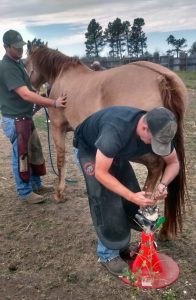A Rewarding Career with Horses

Farriers get to apply their knowledge and skill towards helping horses by taking care of their feet.
Right now is a good time to get into the farrier industry. Horse numbers have remained steady in recent years. Even though the horse market has taken a hit, the number of people that are involved in the horse industry is quite high. Horse enthusiasts are still participating in equine events and activities. All of these horses need hoof care.
The dynamic of horse owners has changed. In the past, almost all horse owners were very knowledgeable and adept at taking care of all their horses’ needs themselves. Most horse owners would deworm, vaccinate, float teeth, trim and shoe their own horses. In the last 30 years, horse owners have increasingly relied on horse professionals (i.e. veterinarians, farriers, trainers, barn managers) for their horse care needs.
Horses require regularly scheduled hoof care. On average, horses need their feet trimmed every six to eight weeks (similar to a person trimming their fingernails). Professional farriers trim horses and shoe horses that need additional protection or support. Horses are individual and require specific attention. A competent farrier studies an individual horse’s conformation, environment and use, and can offer solutions for each horse’s unique situation. This is a specialized skill set that requires focused training. The more dedicated an individual is to learning and gaining experience, the more business opportunities will be accessible to them in this exciting craft.
Those who have a passion for agriculture, specifically in horses, may feel like there are few jobs available for them to do what they love. Even with an undergraduate degree in Equine Science, most career opportunities may consist of shoveling manure. Of course, many of these passionate individuals opt to become veterinarians in order to work with horses. But some have become discouraged away from vet school because of high tuition costs and a huge time commitment (at least 8 years). Becoming a farrier allows those who are passionate about horses (but not passionate about spending a lot of time and money on school) to work with horses. Many veterinarians enter the profession for the reward of knowing that they are improving the quality of life for horses. Farriers feel this as well when they see the horses they work with feel and perform better.
There are opportunities to make good money in this profession. In areas with large horse populations, it is possible for farriers to earn more than $100,000 per year. Successful businesses depend on initiative and how wisely the farrier runs his or her business. Business training is just as important as the practical vocational training. It is always rewarding to hear from a former student that is excited to report that they were able to quit their full- or part-time job to practice farriery exclusively. It has also been rewarding to hear from former students who report that they are making a six-figure income from horseshoeing!
The idea of making a lot of money is appealing, but make no mistake – farriers earn their money. It is hard work. This makes some people shy away from it. For this reason, the field is not saturated with skilled professionals. There is a need for competent professionals who are interested in providing specific, high-quality horse foot care. These individuals can have a rewarding career. In her e-book, Strike of the Hammer, Lynne Caulkett said, “For those willing to take it seriously, and approach it like a real profession, this is a good time to be a farrier.” If you love working with horses, and are not afraid of hard work, a rewarding career as a farrier may be for you.
Related Posts
-
Draft or heavy horse shoeing is different from light horsesh...Jul 18, 2019 / 0 comments
-
Answer: You are not required to read all the pages before yo...Dec 15, 2009 / 0 comments
-
Blog Categories
- Anatomy
- Best Business Practices
- Conformation
- Current Events
- Customer Service
- Draft Horse Shoeing
- Equine Soundness
- Essential Anatomy Kit
- Farrier Careers
- Farrier training
- Foal soundness
- Horse Care
- Horse Foot Care
- Horse Owner Tips
- Horsemanship
- Horseshoeing
- Horseshoeing History
- Iron and Forge Work
- Student Spotlight
- Uncategorized
- Veterinary Care
Blog Archives
Contact Us
Butler Professional Horseshoeing School
495 Table Road
Crawford, NE 69339
(800) 728-3826
jacob@dougbutler.com
Subscribe to Our Blog
Get Our Free e-Book!
If you think you want to become a farrier (or know someone who does), this book can help you make that decision. Horse owners will learn the importance of choosing a qualified farrier and how to select the “right” one.
[ Get the e-Book Now! ]
- Follow:
